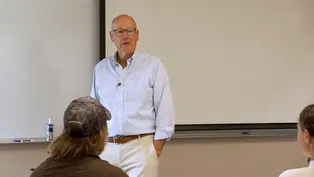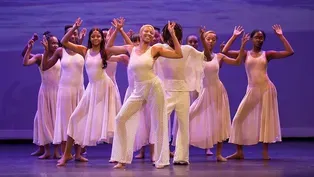
Iowa Arboretum
Clip: Season 2 Episode 205 | 5m 15sVideo has Closed Captions
The Iowa Arboretum is creating a space for people of all abilities to explore, interact and play.
Just north of Madrid, the Iowa Arboretum is creating a space for people of all abilities to explore, interact and play together.

Iowa Arboretum
Clip: Season 2 Episode 205 | 5m 15sVideo has Closed Captions
Just north of Madrid, the Iowa Arboretum is creating a space for people of all abilities to explore, interact and play together.
How to Watch Iowa Life
Iowa Life is available to stream on pbs.org and the free PBS App, available on iPhone, Apple TV, Android TV, Android smartphones, Amazon Fire TV, Amazon Fire Tablet, Roku, Samsung Smart TV, and Vizio.
Providing Support for PBS.org
Learn Moreabout PBS online sponsorship♪♪ ♪♪ [Kim Anderson] The Iowa Arboretum and Gardens is a gem in Boone County.
It feels like it's in the middle of nowhere and it kind of is.
But that's part of its charm.
And I really like that about it because you kind of feel like you're traveling to this place and when you get here it really is a magical place.
And to see the smiles and the aha moments on people's faces, especially children, is really satisfying to me.
♪♪ [Kim Anderson] We offer exceptional experiences for people of all ages and abilities outdoors in nature.
And we take that very seriously as one of our goals.
We have gardens, we have tree groves, we have a wetland, we have a children's garden, we have butterfly gardens.
We have a treehouse village, which has just been erected and just opened recently.
That offers woodland trails and prairie trails, accessible playground area and some other opportunities in the forest to be out in nature and be creative and just be one with nature.
♪♪ [Kim Anderson] We have a program here, a philosophy really, that the Arboretum should be for all.
And so, we call it the Arboretum for All and we have spent a lot of time, gotten grants and donations to make all aspects of the Arboretum as accessible as possible.
♪♪ [Kim Anderson] Woodward Academy is a special needs school in the Woodward-Granger School District.
And they reached out and wanted to come to the Treehouse Village and they have a lot of children that have cognitive and behavioral disabilities.
[Kelle Miller] The opportunity that it provides our students, they don't necessarily get a whole lot of opportunity at enjoying these types of places because of their abilities or their disabilities.
So, this allows all of our students to get to come and enjoy it and have fun.
Are you having fun?
Yeah.
What's your favorite thing you've done so far?
Doing that.
Walking across the web?
That was tough, wasn't it?
Should we start calling you spider Danny?
Spiderman.
Spiderman?
Yeah.
All right, man.
You've got lots of nicknames.
[Kelle Miller] They should have the opportunity like everybody.
If you were to have a conversation with most of those children, they would tell you and express that they want to be like everybody else.
And this gives them that opportunity, which is phenomenal.
[Kim Anderson] The Treehouse Village being as an accessible area allows them to walk up ramps instead of having to climb if they are afraid of doing that or if they are not ready to do that.
There's a lot of options for kids of all abilities to choose from to get up to the top, go down the slides.
[Kelle Miller] There's nothing they can't do.
They can be wheelchair bound and still go in the swing in their wheelchair and it's safe, it's secure.
And they can get that kind of funny feeling in their tummy from swinging.
Whoa!
Woo hoo!
[Kelle Miller] And the zipline, it's a seat that they're sitting in that they are seat belted in so they can experience life like they probably haven't before.
♪♪ [Kelle Miller] Just feeling that connection with Mother Nature is so important.
Getting the sun shining on you and the wind blowing in your face and the smells that you get, but then also the sounds and being connected with the birds and whatever animals you might be crossing paths with.
[Eric Pagel] We actually do a lot in nature because a lot of our kids honestly perform a lot of screen time.
So, any time we can get out in nature and just realize the benefits that nature offers such as massage therapy from the wind, aroma therapy from all of the plants around, all of the different therapeutic elements that nature provides that our kids honestly don't get an opportunity to be out here very much.
I love the difference that we make as a school.
♪♪ [Kim Anderson] I think connecting to nature is just a very important aspect of people's health and mental health and really being out in nature is so important in helping them develop new skills, ask new questions, learn new things, interact with different people in different settings and can really pull kids out of their shells a little bit.
♪♪ [Kelle Miller] There is really a lot for individuals with disabilities to do in this state.
And this is probably the coolest thing that we've done.
The mobility issues aren't really a big issue here because of how adaptable this playground is.
♪♪
Video has Closed Captions
Join a conversation with retired national TV reporter Harry Smith. (8m 59s)
Video has Closed Captions
The Swan Project is a Des Moines program that offers dance lessons for Black and brown youth. (9m 1s)
Providing Support for PBS.org
Learn Moreabout PBS online sponsorship












